 Apologies are not Enough
Apologies are not Enough
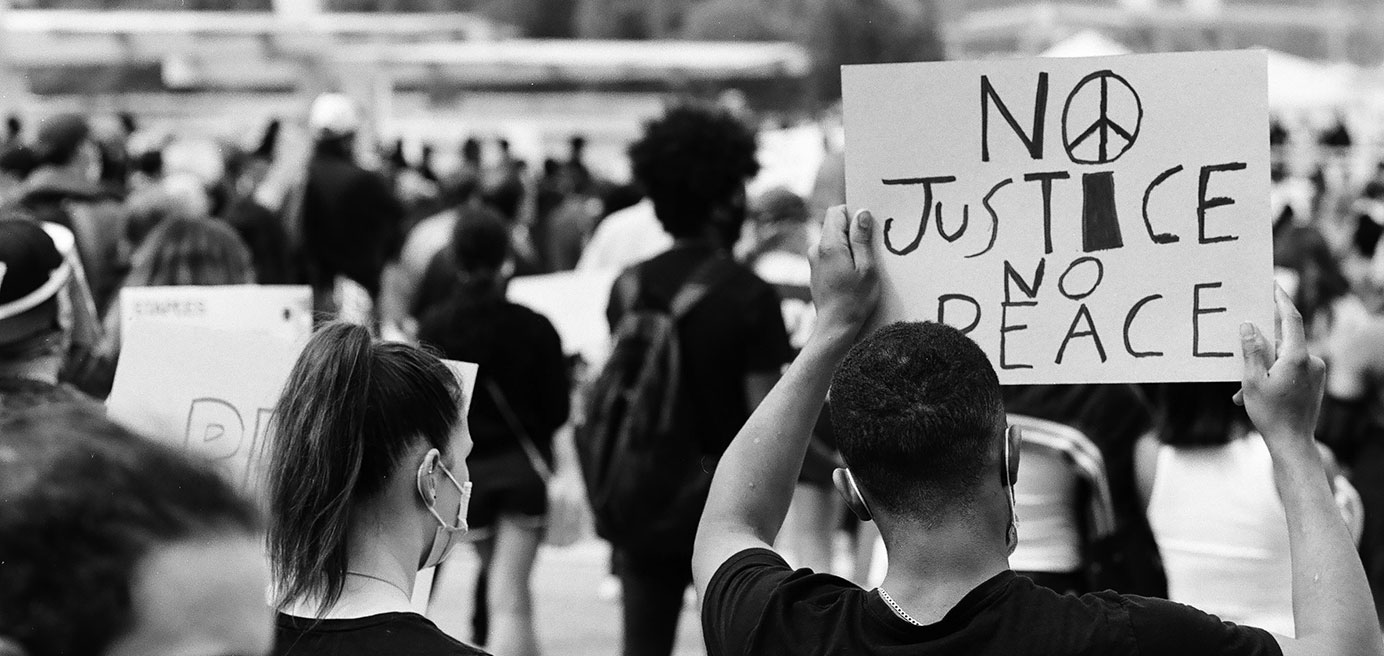
We're in this together." It's a sentiment that reflects the mutual support and shared sacrifices of Canadians across the country, and indeed people around world, as communities come together to confront the COVID-19 pandemic and help each other endure the tragic consequences of a virus that's been responsible for over 10,000 preventable deaths in Canada alone.
But this year has been marked by another kind of pain, as racist incidents have killed Black and Indigenous people in Canada, as well as the US and around the world.
George Floyd, a Minneapolis Black man, was killed when restrained by police in May. His dying words "I can't breathe!" echoed that of another Black man, Eric Garner, who was killed under similar circumstance by New York police in 2012. Their final pleas became a rallying cry at mass protests throughout the summer and a metaphor for the oppression that people of colour experience by virtue of their very existence in a white world.
Here in Canada, we were outraged and heartbroken by the deaths of Brampton man D'Andre Campbell and Toronto woman Regis Korchinski-Paquet, both of whom died in April and May after calling the police in distress. Then, in June, Chantel Moore, an Indigenous woman in New Brunswick was killed when police were called to perform a wellness check on her. And Ejaz Choudry a South Asian senior in Mississauga was fatally shot by police later that month during a mental health crisis.
For many Black and Indigenous people, and people of colour, there was a feeling that perhaps we were not all in this together after all. The massive public health efforts undertaken to save lives from the coronavirus, and the collective sentiment of the moment, made these killings that much more difficult to understand and the harm that much more egregious.
Just as painful was the inability and unwillingness on the part of many leaders – from the RCMP to the then-federal Conservative leader Andrew Scheer – to acknowledge that Black, Indigenous and people of colour endure a daily lived reality that is different from that of white Canadians – and that systemic racism exists in Canada.
Fortunately, many institutions and organizations, from the federal government to the corporate sector and unions, have acknowledged that racism is real and that the idea of race – a social construct with no scientific basis whatsoever – can be all too real, and even deadly, in its effects.
"BCNU is strongly committed to the principles of justice, equity and the equitable access to the social determinants of health – and it is on this basis that we stand in solidarity with all Black and Indigenous people in the fight for social and economic justice and against the forces of systemic racism," says union president Christine Sorensen. "As nurses, we are uniquely placed to advocate for the dismantling of systems of oppression, because every day we see how they negatively impact the health and wellbeing of individuals and communities alike."
Multiple ant-racism events organized by the Black Lives Matter movement were held across Canada in June, following days of rallies against racism and police brutality in numerous American cities. Prime Minister Trudeau attended an Ottawa demonstration to take a knee and a moment of silence. He acknowledged the issue of systemic racism in policing was long-standing and needed addressing.
"Far too many Canadians feel fear and anxiety at the sight of law enforcement officers," he said. "Over the past weeks, we've seen a large number of Canadians suddenly awaken to the fact that the discrimination that is a lived reality for far too many of our fellow citizens is something that needs to end."
That lived reality was on display for all Canadians to see this October, when a dispute over Mi'kmaw fishing rights in Nova Scotia escalated into violence, destruction and eventually an angry mob attack on Indigenous-used fishing pounds. Hundreds of lobster traps were destroyed or seized by non-Indigenous commercial fishers, two Mi'kmaw fishing boats were set on fire and a Mi'kmaw fish processing plant was burned to the ground. All the while, the local police largely stood by and watched, and the RCMP and federal government have been criticized for failing to intervene to uphold negotiated treaty rights.
And so it continues.
BCNU's Mosaic of Colour Caucus is one of four equity-seeking caucuses in the union. Through the BCNU Human Rights and Equity Committee, it works to enhance the voice and place of members who have experienced historic and systemic discrimination and marginalization. The Mosaic of Colour Caucus is also a safe space for workers of colour to address the effects of racism and discrimination in their community and their practice.
Update Magazine spoke recently with BCNU member Ashana Ramsay, who shared her thoughts on what it means to be a nurse and worker of colour in these challenging times. A psychiatric nurse, Ramsay works for Burnaby Centre for Mental Health and Addictions. She is also a steward and the Richmond-Vancouver region rep on the Mosaic of Colour Caucus.
UPDATE This year, in the wake of the George Floyd killing in June, the slogan "Black Lives Matter" was acknowledged and endorsed by a wide range of allied communities and organizations. That was not the case in the past, since the Black Lives Matter movement began in 2013. What has changed?
RAMSAY It's thanks to social media. We saw for the first time a public killing – what I call an assassination – of a Black man by law enforcement. We've seen killings of Black people before, but this time we were able to see the face of the law enforcers, and people were angry, calling on [police officer Derek Chauvin] to get off of him and let him go. But it was like his humanity was gone, and he had no regard for this person's life. We saw this person die in front of our eyes and I think that's what really changed. We witnessed, not just a death, but a killing from start to end.
It really troubled a lot of people. When it first happened, we were still trying to process it and then I think a lot of emotions kicked in. In the Black community we have a way of suppressing our feelings and the pain and the trauma we've experienced over the years. I think the death of George Floyd, may he rest in peace, broke down that wall and everything came out— all of the pain and oppression, all of the injustice.
Despite all of the silencing from the system we live in, we finally said we cannot sit around and watch this. We cannot just be silent. We have to do something. Enough is enough.
UPDATE So far, we have words. We have Justin Trudeau taking a knee. Those are acknowledgements that systemic racism is a problem that requires attention. But what needs to happen to ensure that no more George Floyds are killed?
RAMSAY The problem with racism is that we've been erased from history. It's at the very level of the education and the school system. I immigrated here from Jamaica when I was four years old and I grew up here. But I was never educated about Black history in school. It wasn't until I became an adolescent, and my mom put me into programming in the Black community, that I started learning about my history. It was never present otherwise. So, at a very basic level, we need education. We also need cultural sensitivity education in school boards, and it needs to happen here in the union. We need education.
People don't recognize something they don't understand. They don't understand that, unfortunately, some of their actions are racist. But once you use that word "racist" they get scared and they try to silence.
Racism is a form of harassment and trauma is a form of pain that should be regarded no differently than violence against nurses. Racism is a form of violence toward me, an individual and a member of a union.
It's one thing to say we're dealing with racism and another thing to actually address it. So, I'm hopeful that in the future there will be opportunities to educate everyone from members, to stewards and staff – everyone throughout the union.
And in our political system, we saw [federal NDP leader] Jagmeet Singh get shut down in the House of Commons when he spoke up against racism. I think the problem is people are very afraid of the word "racism." But we need to address it. We can no longer be afraid of it. Systemic racism does exist and it needs to be up front in a lot of education in order to change it.
UPDATE Education is a two-way street. As you say, education requires a willingness to listen, to open your ears and your heart. How do we break through barriers of hate when, by definition, hate is something that does not want to listen or allow education to happen?
RAMSAY It's going to be a long road and it's going to be difficult, but I think we do have to call out privilege. We need a campaign with shock value. But I think there is going to be a lot of pushback and we need allies because we cannot do it alone.
UPDATE It's one thing to call out systemic racism in some quarters, like the police, where we can understand how racism would operate within that institution. But recently we saw the death of Joyce Echaquan, an Atikamekw woman admitted to a Quebec hospital for severe stomach pain and who posted a live video on Facebook of nurses taunting her with racial jibes before she died.
In health care we are educated in caring and treating the patient. So how does it feel as a nurse – and a Black nurse – to witness or experience this kind of racism from people trained to care for all and not judge?
RAMSAY Racism is real in health care and, unfortunately, it's not surprising. Speaking as a Black nurse, and on behalf of a lot of other nurse colleagues, we experience racism and discrimination with a smile.
You'll notice it in the actions of leadership. You may have the same amount of education, the same amount of experience or even more education and experience, but you won't be offered the position. Or you'll be disciplined more harshly for something if you're Black. Or you might be given a heavier load. You'll experience discrimination just because you're different, or because English is your second language. It's very hard, and I've noticed it more in acute care.
Fortunately, where I work right now, we have a diverse staff and leadership, which is amazing. But I do find that, as a Black nurse, you have to work twice as hard. You have to do everything by the book, and you have to be very, very particular about your work while other colleagues don't – and I think that's where the privilege comes in. They get promoted very easily. And if they make a mistake they don't get disciplined in the same way. It's a very difficult situation to be part of.
If there is an incident, it is hard to address because staff are afraid to speak up about it. It may be seen as respectful workplace incident, or called out as bullying or harassment, but it will never be called out as racism because nobody wants to use that word for what it is. Everybody's afraid of it. And it is very discouraging, especially working in mental health because we take care of everybody and we practise client-centered care. So, when it's not reciprocated by staff it's very hurtful and discouraging. It's actually traumatic. It affects your soul, and you have to carry this pain to work and provide care. You don't ever get a break from it.
UPDATE The stress of being the Other every single day must take years off your life. Do you see racism as a public health issue?
RAMSAY I think it is. It's exhaustion. It's trauma. When George Floyd was killed, I remember going to work and everybody kept saying "you're not yourself – you seem different." And it wasn't until I talked to one of my Black colleagues about how I felt exhausted, angry and upset that she said, "Ashana, it's the trauma from what we witness and it's the pain that we carry."
That pain is something we carry around all the time because our issues are not heard and not noticed. The silence is violence and it's never addressed. So, we never have any resolution. Yet we as nurses, we have to take care of people and we have to give our 110 percent. But we're not taking care of ourselves. So it's hard. It is hard.•
UPDATE (Winter 2020)
UNDERSTANDING AND DISMANTLING RACISM: A BOOKLIST
All BCNU members can work to proactively make change in society by becoming a better ally and listening to the experiences of those who are Black, Indigenous and people of colour. Here are just some of the titles you can buy to help educate yourself about systemic racism and its effects.

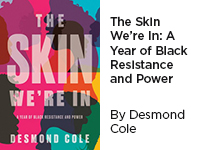
A perspective-shifting book from one of Canada's most uncompromising writers, this is a chronicle of just one year—2017—in the struggle against racism in Canada; a year that saw Indigenous land protectors resisting the celebration of Canada's 150th birthday, police across the country rallying around an officer accused of murder, and more.
PenguinRandomHouse

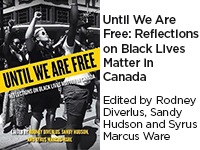
The killing of Trayvon Martin in 2012 by a white assailant inspired the Black Lives Matter movement, which quickly spread outside US borders. Until We Are Free describes the latest developments in Canadian Black activism, organizing efforts through social media, and more.
University of Regina Press

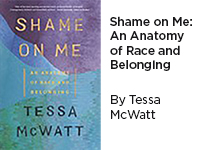
Tessa McWatt interrogates our ideas of race by turning her eye on herself and her body in a personal exploration of history and identity from a writer who, having been plagued with confusion about her race all her life, has at last found kinship and solidarity in story.
PenguinRandomHouse

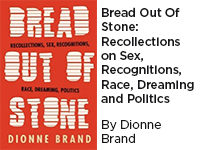
An evocative and insightful essay collection that brings the author's unflinching eye and personal history to issues of sexism and sexual autonomy, the politics of community and the centrality of whiteness in Canadian culture.
PenguinRandomHouse

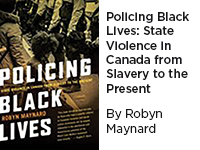
This book delves behind Canada's veneer of multiculturalism and tolerance and traces the violent realities of anti-blackness, from the slave ships to prisons, classrooms and beyond. This first comprehensive account of nearly 400 years of state-sanctioned criminalization of Black lives in Canada calls for the dismantling of structures of domination and re-imagining a more just society.
Fernwood Publishing


